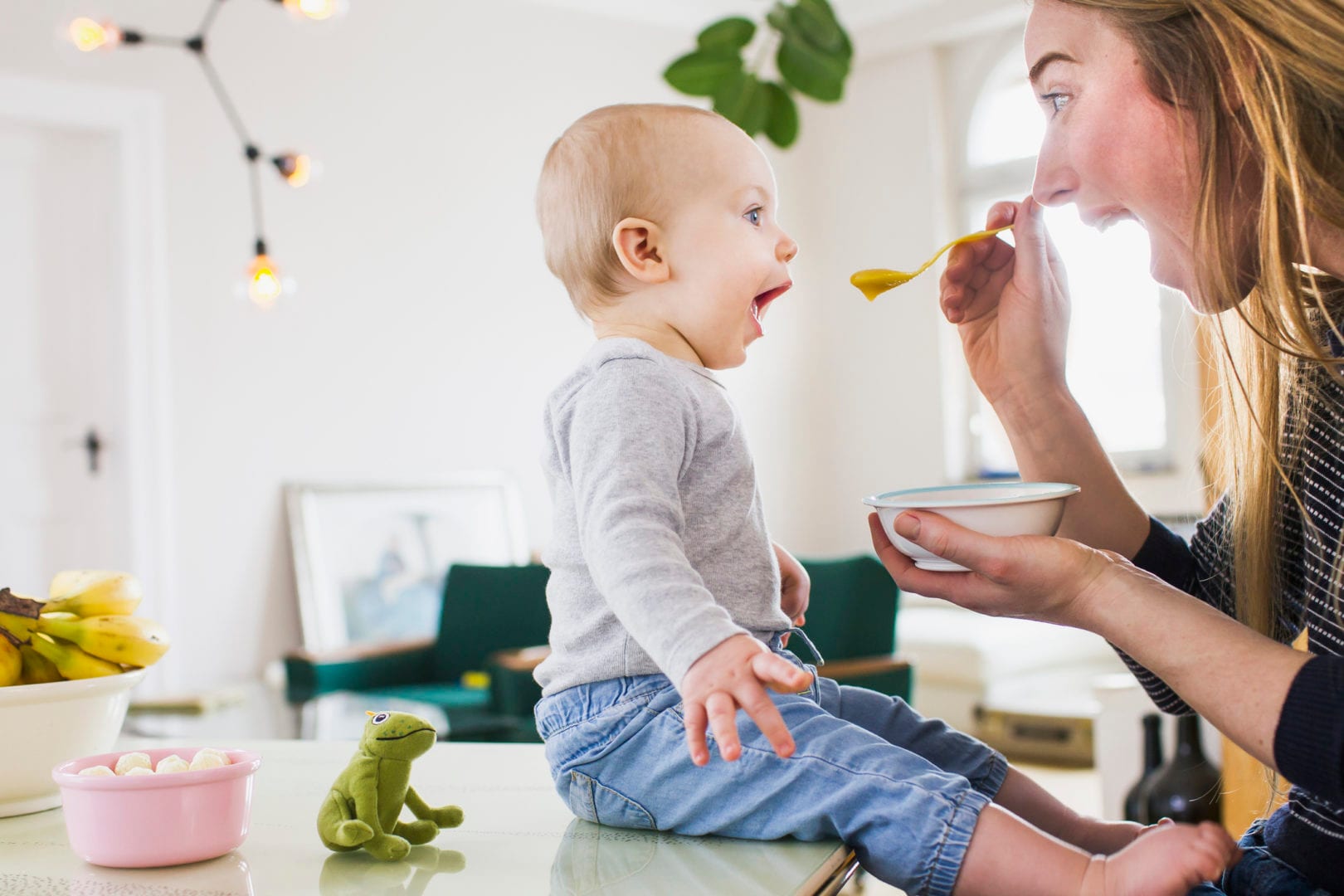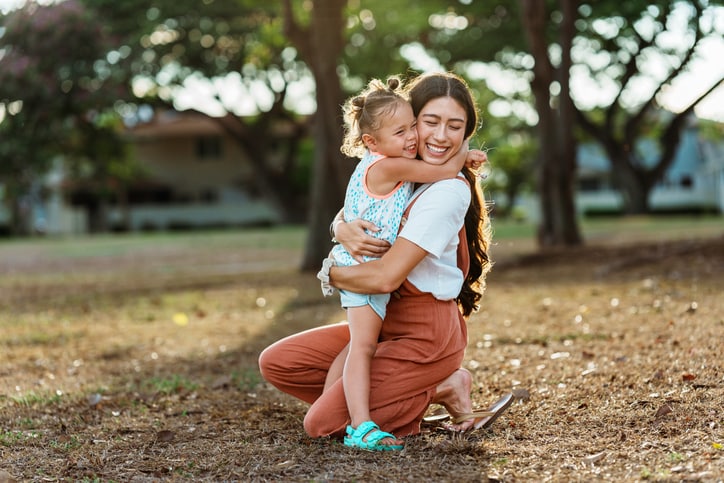You’ve perfected your little one’s favorite carrot purée recipe and nailed it when it comes to petite portion sizes, but now you’re wondering: How long does baby food last? While, unfortunately, there isn’t a one-size-fits-all rule when it comes to storing baby food — a lot of it depends on the ingredients and how it’s prepared — there are definite guidelines to follow.
In addition to baby food storage, there also are safety precautions to keep in mind when making, serving and reheating your little one’s food. (Who knew baby food could be so complicated?!) From food prep techniques that minimize the risk of foodborne illness to the proper way to refrigerate, freeze and thaw foods, here are answers to all your questions about keeping your baby’s food safe.
Are you supposed to heat up baby food?
When opening a new jar of baby food, there’s no need to heat it up. You can serve it at room temperature. However, when serving leftovers or food that’s been previously prepared and refrigerated, your little one, like you, probably doesn’t want to eat it cold. (Also, heating it up will zap bacteria. More on that in a bit.)
Is it safe to heat baby food in the microwave?
“The best way to warm up food is either in the microwave or stove,” says Natalia Stasenko, a registered dietician, child nutritionist and owner of Feeding Bytes. “If microwaving, transfer the food into a microwave-safe bowl and heat on high for about 15 seconds for every four ounces. Before serving, stir it well to make sure there aren’t any hot pockets and test it yourself.”
When reheating foods that contain meat or eggs, Stasenko recommends using the stove since the “high fat content may create overheating.”
How do you cook frozen baby food?
According to the Partnership for Food Safety Education, you should choose one of the following three ways to thaw food that’s been previously cooked and frozen:
Microwave.
Refrigerator.
Placing the frozen jar in cold water.
Once food is defrosted, it should be cooked in the ways recommended above and then cooled to a lukewarm temperature before serving.
What temperature should baby food be?
Bacteria have been killed once the internal temperature reaches 165 F. The best way to ensure refrigerated or frozen food has been sufficiently reheated is to check it with a food thermometer.
Can you save leftover baby food?
Storing baby food once it’s been opened or freshly made depends on both the ingredients, as well as how it’s been prepared. Typically, store-bought food lasts a bit longer than any foods you make from scratch.
Once you open a jar of baby food, place the unused portion in the fridge quickly. According to the Food and Drug Administration (FDA), baby food that has been opened but not refrigerated should be consumed within two hours — possibly less, depending on the food.
“Fruits and vegetables may stay out a bit longer, but meat and poultry should be placed immediately in the fridge to avoid bacterial overgrowth at room temperatures,” says Dr. Sara Siddiqui, a pediatrician and clinical assistant professor in the Department of Pediatrics at NYU Langone’s Hassenfeld Children’s Hospital in New York.
Is it OK to reheat baby food?
“Never reheat cooked food more than once,” Stasenko says. “Doing so can increase the risk of food poisoning.”
So after heating food up for your baby once, toss whatever goes uneaten, even if you didn’t serve it.
How long does baby food last in the fridge?
“Homemade baby food doesn’t last quite as long as jars and pouches from the store,” Stasenko says.
Here are some storage guidelines to follow for both store-bought and homemade baby food.
For store-bought baby food:
“Generally, once opened, fruits and vegetables will last 48 hours in the fridge after opening,” says Siddiqui. “Meats, poultry and eggs should only be stored up to 24 hours.”
For homemade baby food:
“Homemade baby fruits and vegetables should be used within 24 to 48 hours, storing any unused and uncontaminated portions in the refrigerator,” says Siddiqui. “Meats, poultry and eggs should be stored no longer than 24 hours.”
How long does baby food last in the freezer?
Baby foods can be frozen for up to three months, says Siddiqui, when they are stored in freezer-proof containers or ice cube trays that have been covered with heavy duty plastic wrap.
What are the other basics of baby food safety?
Every parent and caregiver making, handling or serving baby food should be aware of these standard safety rules.
Keep things clean
Whether you’re making your own baby food or serving up store-bought goodness, it’s important to be sure everything — and we do mean everything — is clean for baby’s mealtime.
“Parents need to make sure all food prep surfaces, utensils, cutting boards and storage jars are clean and have been washed with hot, soapy water,” says Siddiqui. “Washing hands thoroughly and frequently during food prep and storage will reduce potential contamination, as well.”
The Partnership for Food Safety Education, a nonprofit food safety organization, also stresses the importance of having a designated spot for diaper changing, which — need we even tell you? — should never be the kitchen. And scrubbing up after a diaper change (pee or poo) should always be a nonnegotiable since — brace yourself — “hands contaminated with feces play a significant role in the spread of many bacteria and viruses that can cause food poisoning.”
If you have an older child who’s able to use utensils or pick up food on their own, make sure they clean their hands, as well. If possible, have them use warm water with soap, which has been proven to be more effective than hand sanitizers.
Beware of cross-contamination
While the words “fewer dishes to clean” are music to any parent’s ear, serving your baby food straight from the jar isn’t recommended.
“In order to decrease contamination from normal germs found in saliva, it is best to remove the food that’s needed and serve in a separate container,” says Siddiqui. “Afterwards, discard any food from baby’s bowl that they haven’t eaten since, again, it’s come in contact with saliva.”
On the front-end, take steps to avoid cross-contamination during food prep.
“When making your own baby food, be sure to always use a separate chopping board and knife for raw meat and poultry,” says Stasenko. “Also, keep raw meat and poultry covered and separate from other products in the fridge.”
Carefully inspect
In addition to taking care to properly prepare, store and reheat food, read labels. When using store-bought baby food, be sure to both check the expiration date and make sure the jar lid “pops” when opening it. If it doesn’t, or if you notice chipped glass or rust under the lid, the FDA advises discarding the food. For baby food pouches, make sure the seal isn’t broken.






